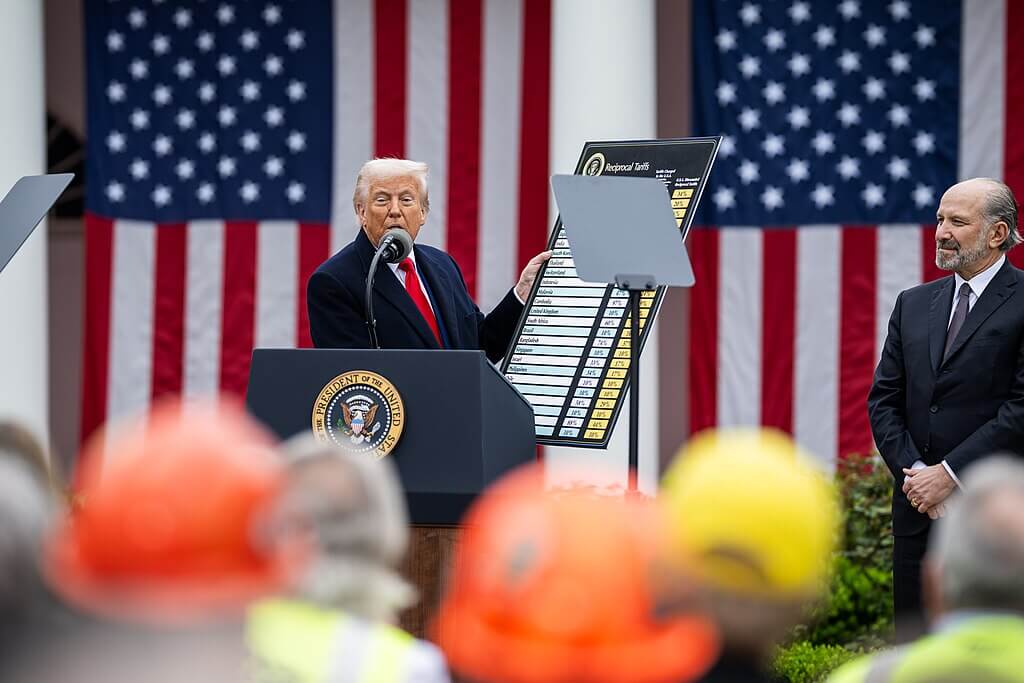Politics
U.S. Tariff Policies Threaten Global Nonproliferation Efforts

U.S. tariff policies have recently taken center stage in international trade discussions, raising concerns about their potential impact on global nonproliferation efforts. While the focus has often been on the economic implications of these tariffs, there has been limited examination of how such measures could undermine the fragile system designed to control the proliferation of weapons of mass destruction (WMD) and related materials. The evolving landscape of trade barriers poses significant risks to the effectiveness of international nonproliferation regimes, primarily reliant on national enforcement of sanctions and strategic trade controls.
Understanding the Nonproliferation Framework
The international architecture governing WMD nonproliferation is built upon key legal instruments, including the Biological Weapons Convention (BWC), the Chemical Weapons Convention (CWC), and the Nuclear Non-proliferation Treaty (NPT). These agreements commit signatory states to prevent the transfer or acquisition of WMD. Their success hinges on the effective implementation of national strategic trade controls, including export regulations and sanctions. Customs authorities are at the frontline, tasked with identifying potential proliferation activities by screening imports and exports for irregularities and inspecting shipments.
Nevertheless, the challenges faced by customs officers have been likened to searching for a “needle in a haystack.” Many items subject to strategic trade controls can also serve legitimate commercial purposes, complicating the identification of illicit transactions. As customs authorities navigate vast quantities of goods, they must also manage compliance with various international laws governing trade in narcotics, wildlife, and human trafficking, while collecting duties and tariffs.
The Rising Threat of Tariff Evasion
The increase in tariffs, particularly those imposed by the United States, has led to a notable rise in tariff evasion incidents. Countries like Iraq and North Korea have historically employed tactics to circumvent international sanctions, including mislabeling goods and utilizing third-party countries for transshipment. As tariff evasion methods become more sophisticated, the volume of trade discrepancies may correlate with heightened risks of proliferation.
Reports indicate that U.S. importers have begun to experience a surge in tariff-related trade fraud since the latest round of tariffs on Chinese goods. With retaliatory tariffs being enacted by other nations, the implications of these trade policies extend beyond the U.S. borders, potentially destabilizing international trade dynamics.
The International Monetary Fund (IMF) has highlighted that the protectionist environment has contributed to structural changes in the global economy, which may impose greater burdens on customs authorities. The increasing volatility of tariff levels disrupts established trade patterns, complicating efforts to detect anomalies that could signal proliferation risks. Moreover, disruptions to supply chains present opportunities for actors with malicious intent to exploit less secure vendors.
Cooperation among nations is vital for effective nonproliferation efforts. The commitments made by signatories to the BWC, CWC, and NPT are reliant on collaborative efforts to harmonize export controls and share vital information. Unfortunately, the focus on managing trade disputes stemming from protectionist policies diverts attention from shared challenges, undermining international cooperation.
Customs authorities face an expanding portfolio of responsibilities and cannot be expected to effectively monitor proliferation risks if burdened by tariff enforcement priorities. It is essential for governments to recognize that trade measures and security objectives should be viewed as interconnected rather than separate domains. Establishing strategic trade control systems insulated from tariff volatility, alongside enhanced interagency coordination, will be crucial in safeguarding against proliferation.
As the global landscape of trade continues to evolve, the implications of U.S. tariff policies extend far beyond economic considerations. The risk of undermining the established frameworks for WMD nonproliferation poses a significant threat to international security. Without a renewed commitment to fortifying the nonproliferation architecture, countries may inadvertently create opportunities for proliferators to exploit the resulting chaos in trade regulations.
-

 Lifestyle3 months ago
Lifestyle3 months agoLibraries Challenge Rising E-Book Costs Amid Growing Demand
-

 Sports3 months ago
Sports3 months agoTyreek Hill Responds to Tua Tagovailoa’s Comments on Team Dynamics
-

 Sports3 months ago
Sports3 months agoLiverpool Secures Agreement to Sign Young Striker Will Wright
-

 Lifestyle3 months ago
Lifestyle3 months agoSave Your Split Tomatoes: Expert Tips for Gardeners
-

 Lifestyle3 months ago
Lifestyle3 months agoPrincess Beatrice’s Daughter Athena Joins Siblings at London Parade
-

 World3 months ago
World3 months agoWinter Storms Lash New South Wales with Snow, Flood Risks
-

 Science3 months ago
Science3 months agoTrump Administration Moves to Repeal Key Climate Regulation
-

 Business3 months ago
Business3 months agoSoFi Technologies Shares Slip 2% Following Insider Stock Sale
-

 Science3 months ago
Science3 months agoNew Tool Reveals Link Between Horse Coat Condition and Parasites
-

 Science2 months ago
Science2 months agoSan Francisco Hosts Unique Contest to Identify “Performative Males”
-

 Sports3 months ago
Sports3 months agoElon Musk Sculpture Travels From Utah to Yosemite National Park
-

 Science3 months ago
Science3 months agoNew Study Confirms Humans Transported Stonehenge Bluestones








